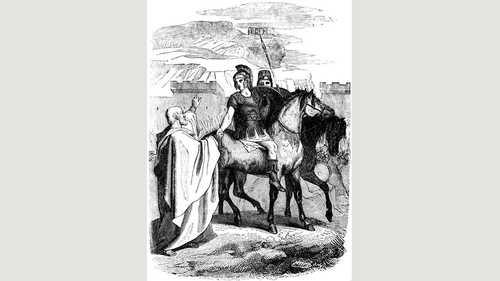How stories have shaped the world
Curated from: bbc.com
Ideas, facts & insights covering these topics:
6 ideas
·2.95K reads
21
1
Explore the World's Best Ideas
Join today and uncover 100+ curated journeys from 50+ topics. Unlock access to our mobile app with extensive features.
Ancient stories that shaped history
Alexander the Great learned to read and write by studying Homer's Iliad. Thanks to his teacher, the philosopher Aristotle, he had done so with unusual intensity. When Alexander embarked on his conquests, a copy of the Iliad accompanied him.
Homer's Iliad helped to shape an entire society and its ethics. The story revealed the kind of effect moral choices could have on the general public.
76
516 reads
The importance of poetry
Chinese literature is based on the Book of Songs, a collection of simple poems that have accrued much interpretation and commentary.
The Book of Songs enshrined poetry as the most important form of literature across East Asia.
81
968 reads
Stories shape language
As more and more parts of the world became literate, new technologies such as paper and print increased the reach and influence of written stories. More readers meant new stories started to appear.
When Dante Alighieri wrote his Comedy in the spoken dialect of Tuscany, it helped to turn the dialect into a legitimate language we now call Italian.
70
358 reads
Mass production and literacy
The era of mass production and mass literacy we have today is the result of the invention of print in northern Europe by Johannes Gutenburg.
Novels didn't have the baggage associated with ancient forms of literature. They allowed new types of authors and readers, especially women who used novels to engage with the most pressing questions of modern society.
60
310 reads
Novels shape ideas
Mary Shelley's Frankenstein is at the forefront of what would come to be known as science fiction, revealing the promise of science and its destructive potential.
Similarly, novels were used by emerging countries to assert their independence. Political independence needed cultural independence, and novels proved the best way of gaining it.
64
303 reads
Censored literature
The printing press also made it easier to control and censor literature. It became a problem for authors living in regimes such as Nazi Germany or the Soviet Union.
Today, we are living through another revolution in writing technologies. The internet is changing how we read and write, how literature spreads, and who has access to it.
60
495 reads
IDEAS CURATED BY
Michelle E.'s ideas are part of this journey:
Learn more about communication with this collection
The importance of perseverance
How to embrace failure as a learning opportunity
The power of innovation and creativity
Related collections
Similar ideas
4 ideas
5 ideas
9 ideas
Read & Learn
20x Faster
without
deepstash
with
deepstash
with
deepstash
Personalized microlearning
—
100+ Learning Journeys
—
Access to 200,000+ ideas
—
Access to the mobile app
—
Unlimited idea saving
—
—
Unlimited history
—
—
Unlimited listening to ideas
—
—
Downloading & offline access
—
—
Supercharge your mind with one idea per day
Enter your email and spend 1 minute every day to learn something new.
I agree to receive email updates

